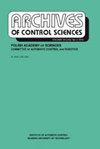可移动热源有限棒的加热控制
IF 1.1
4区 计算机科学
Q4 AUTOMATION & CONTROL SYSTEMS
引用次数: 1
摘要
利用格林函数方法研究了源沿可控轨迹运动的有限杆在有限时间内的精确和近似零可控性。源的强度保持不变。应用最近发展的格林函数方法,将精确零可控性的分析简化为一个关于控制函数的非线性约束的无穷系统。得到了棒材近似零可控性的一个充分条件。由于约束系统的精确解是一个长期存在的开放问题,因此使用一些启发式解来代替。在近似可控的特殊情况下,证明了这些解的有效性。本文章由计算机程序翻译,如有差异,请以英文原文为准。
Heating control of a finite rod with a mobile source
The Green’s function approach is applied for studying the exact and approximate null-controllability of a finite rod in finite time by means of a source moving along the rod with controllable trajectory. The intensity of the source remains constant. Applying the recently developed Green’s function approach, the analysis of the exact null-controllability is reduced to an infinite system of nonlinear constraints with respect to the control function. A sufficient condition for the approximate null-controllability of the rod is obtained. Since the exact solution of the system of constraints is a long-standing open problem, some heuristic solutions are used instead. The efficiency of these solutions is shown on particular cases of approximate controllability.
求助全文
通过发布文献求助,成功后即可免费获取论文全文。
去求助
来源期刊

Archives of Control Sciences
Mathematics-Modeling and Simulation
CiteScore
2.40
自引率
33.30%
发文量
0
审稿时长
14 weeks
期刊介绍:
Archives of Control Sciences welcomes for consideration papers on topics of significance in broadly understood control science and related areas, including: basic control theory, optimal control, optimization methods, control of complex systems, mathematical modeling of dynamic and control systems, expert and decision support systems and diverse methods of knowledge modelling and representing uncertainty (by stochastic, set-valued, fuzzy or rough set methods, etc.), robotics and flexible manufacturing systems. Related areas that are covered include information technology, parallel and distributed computations, neural networks and mathematical biomedicine, mathematical economics, applied game theory, financial engineering, business informatics and other similar fields.
 求助内容:
求助内容: 应助结果提醒方式:
应助结果提醒方式:


